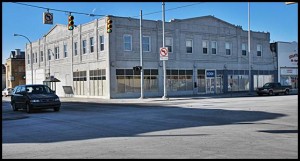Federal law played a role in city’s zoning law

The Al-Islah Islamic Center plans to move from its Caniff location into one of the city’s largest commercial buildings, located at the northwest corner of Jos. Campau and Caniff.
By Charles Sercombe
So, just how did a mosque get permission to take over one of the city’s largest commercial buildings located in the heart of the business district?
It was a pretty simple slam-dunk affair, and it appears, by law, city officials had little choice in the matter.
According to the September meeting minutes of the Zoning Board of Appeals, the only opposition facing the Al-Islah Islamic Center to move into a building on the northwest corner of Jos. Campau and Caniff (specifically 11301-11303 Jos. Campau) came from developer Henry Velleman, who owns several commercial buildings on Jos. Campau.
That opposition came in the form of a letter. The contents of the letter were not available at press time on Thursday.
In support of what is technically called a zoning variance were several speakers. The applicant applying for permission to allow the building to go from being zoned strictly for commercial use on the ground floor and commercial/residential use on top to use as a religious institution was Abdul Motlib.
Motlib said the Islamic Center’s current location at 2733 Caniff (just around the corner from the Campau-Caniff building) was too small for his 200-300 worshipers. He also added, under questioning from the zoning board, that it will take up to $800,000 to remodel the 20,000 square-foot, two-story building.
Others in attendance stressed that a religious institution will increase safety in the area and promote peace.
Ted Radzilowski of the Piast Institute, located a few blocks away from the building in question, told the ZBA it is important to allow ethnic groups to build institutions so they remain in the community.
The Islamic Center is used mostly by the Bengali community.
The Rev. Sharon Buttry of Acts 29, a Christian organization located on Jos. Campau in a former auto dealership, also said she supported the variance.
Dawud Walid of Detroit, who said he works for a Muslim civil rights organization, said the zoning board needed to be mindful of the federal law called the Religious Land Use and Institutionalized Persons Act.
The Act imposes tough restrictions on communities that seek to keep out religious institutions from commercial zones.
But that doesn’t mean Hamtramck’s hands were tied, according to the Newcomb Law Group out of California, which says that under the Act communities can indeed prohibit such requests.
On its website, the Newcomb Law Group addresses the issue this way:
“Question: Does RLUIPA (Religious Land Use and Institutionalized Persons Act) make it illegal to prohibit churches from a particular zone?
“Answer: No. An argument often made by those supporting religious institutions is that RLUIPA makes it illegal to prohibit religious institutions within a zone. This is not accurate and such a broad application of RLUIPA was never intended by the original drafters of the law and has been rejected by the courts on numerous occasions.”
However, in a telephone interview with The Review, Michael Newcomb from the Newcomb Law Group said that in order to prevent religious institutions from being granted a zoning variance, the city must first update the language of its zoning ordinance to meet the provisions of the Religious Land Use Act.
He said that although the Act is 12 years old, a number of communities are only now being exposed to the ramifications of the Act. Newcomb stressed that Hamtramck needs to move fast to stem the ongoing development of tax-exempt operations from setting up in commercial zones.
“If you create a non-profit hub in the city, how will it pay for its services?” he said.
Tax-exempt operations include religious institutions, such as a church or a mosque. According to the city’s Treasury Department, the 2012 property taxes for the Campau-Caniff building amounted to $9,850. As a mosque, the city will no longer collect property taxes for this site.
With this mosque moving into the Campau-Caniff building, there will be a total of three Islamic centers located on one block. There is also another mosque on the southend of Jos. Campau and a Christian-based faith operation on the northend.
The Piast Institute, on Jos. Campau, is also tax-exempt.
According to the minutes of the September zoning board meeting, the financial impact of the variance was touched on by Zoning Board Chairman Steve Cherry, who also sits on the city’s Plan Commission.
He stressed that those commissioners who were concerned about losing property taxes because of the variance needed to consider what the Religious Land Use law says and insisted the city’s zoning laws are illegal.
The commission, consisting of Cherry, Alan Ferszt, Mark Hausner, Nasr Hussain, Mohamed Delawar Hussain and John Gray Kales, voted unanimously in favor of the mosque.
(Boardmembers Andrew Biscoglia and Mohammed Rahman were absent.)
Although the mosque got the go-ahead to use the building for religious purposes, it still has one more hurdle to jump. The mosque is seeking a variance of the city’s façade requirements because the design it presented to the Plan Commission fell short of a requirement that at least 70 percent of the façade be made up of see-through windows.
The Plan Commission gave its preliminary approval of the design variance as long as the Zoning Board of Appeals also agrees. The zoning board is scheduled to take up the issue at its Feb. 6 meeting.


Detroit diesel
January 28, 2013 at 10:00 pm
How many mosques do they need in a city this small.
Sounds like they are just shoveing it in our face!
Where are the bar owners? They will be out of work soon.